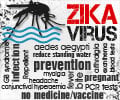- The Zika virus can cause congenital defects in newborns
- In the infected newborns, even though there is no sign of physical anomaly, they might develop retarded cognitive development //
- Zika-exposed children need extra care to cope with school
Preschool neurodevelopment in Zika virus-exposed children without congenital Zika syndrome
Go to source). "There are still many unanswered questions about the long-term impacts of Zika virus on the children who were exposed to it while in their mother’s womb ," says Sarah Mulkey, M.D., Ph.D, a prenatal-neonatal neurologist in the Prenatal Pediatrics Institute at Children’s National Hospital and the study’s first author. "These findings are another piece of the puzzle that provides insight into the long-term neurological development of children with prenatal Zika virus exposure." "Further evaluation is needed as these children get older." It has not been clear how children who were exposed to the Zika virus in the womb during the 2015–2017 epidemic but did not develop CZS or serious neurological complications will develop as they get older.
When compared to control children, parents of Zika-exposed children reported considerably lower mobility and responsibility, though changes in cognitive function scores just weren't significant. Furthermore, 6 (11%) of Zika-exposed children's parents experienced mood difficulties compared to 1 (1%) of normal controls, and Zika-exposed parents were considerably more likely to indicate parental distress.
Professional testing revealed no significant differences in the Zika-exposed children’s manual dexterity, such as their ability to catch an object or post a coin through a slot, compared to the control children. Both Zika-exposed and control children also scored poorly on readiness for school.
Parents' perceptions or heightened concern about their child's growth may have influenced parental responses in Zika-exposed youngsters. Some of the discrepancies in results could also be attributed to age and, thus, developmental disparities between both groups of kids.
Symptoms and Signs of Zika Virus
The most common symptoms of Zika are fever, rash, headache, joint pain, red eyes, and muscle pain. Zika is spread mostly by the bite of an infected mosquito. Zika can cause birth defects and is linked to Guillain-Barré syndrome (2✔ ✔Trusted SourceGuillain-Barré syndrome related to Zika virus infection: A systematic review and meta-analysis of the clinical and electrophysiological phenotype
Go to source).
How to Protect Yourself from the Zika Virus
- The best way to prevent Zika is to protect yourself from mosquito bites, as the virus is transmitted through mosquito bites.
- Everyone, especially pregnant and breastfeeding women, should take steps to prevent mosquito bites.
- When used as directed, EPA-registered insect repellents are proven safe and effective, even for pregnant and breastfeeding women.
Zika Virus: A Review of Literature
Go to source).
It can be concluded that, while these Zika-exposed children are developing normally, they may require additional assistance as they prepare to enter school.
- Preschool neurodevelopment in Zika virus-exposed children without congenital Zika syndrome - (https://www.nature.com/articles/s41390-022-02373-5)
- Guillain-Barré syndrome related to Zika virus infection: A systematic review and meta-analysis of the clinical and electrophysiological phenotype - (https://pubmed.ncbi.nlm.nih.gov/32339199/)
- Zika Virus: A Review of Literature - (https://pubmed.ncbi.nlm.nih.gov/30254814/)
Source-Medindia










